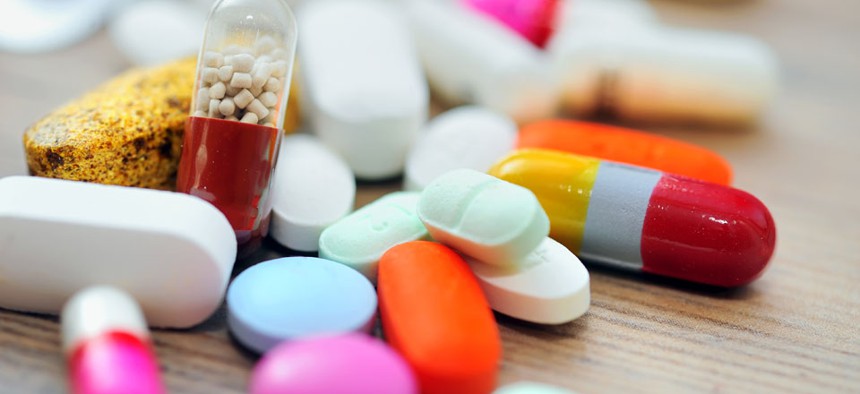How Google and the Feds Are Trying to Protect Your Drug Supply

jordache/Shutterstock.com
The Internet giant is working with the government to fight illegal online pharmacies.
The upside of online shopping is that it puts the Internet's full selection at your fingertips. The downside is that it's harder to know exactly what you're buying. When it comes to buying medicine, that downside can be deadly.
Illegal online pharmacies are a particularly dangerous and elusive sector of the growing problem of counterfeit drugs. The scope of the Internet compounds the rapid globalization of the drug supply chain and its increasingly dangerous misuse, making illegal sellers more difficult to trace.
As a result, major Internet players—including Google—are working with the federal government to battle the problem. Aiming to pinpoint and verify every alleged online pharmacy is near-impossible, so the focus is instead on limiting their use through consumer education, restricting their appearance in Internet searches, and enforcing harsher punishment.
Currently, 35,000 to 50,000 active Internet pharmacies are believed to be operating, and 97 percent of those surveyed do not meet U.S. standards, according to a 2013 report from the National Association of Boards of Pharmacy. This could mean they are not approved by the FDA, or tht their pharmacists are not licensed by the state licensing board.
Counterfeit drugs are often produced in unsanitary conditions, and they may include none of the active pharmaceutical ingredient, incorrect dosages, incorrect ingredients, and even poisons. The difference in composition can cause harm or death in unknowing consumers.
The Food and Drug Administration Safety and Innovation Act passed in 2012 and the Drug Quality and Security Act of 2013 include guidance regarding safety of the legitimate drug supply chain. Both laws are in the process of being implemented, and they involve tighter track and trace security as drugs travel between manufacturer and patient.
Yet regulating Internet pharmacies can be more challenging because they sell directly to consumers, and it can be nearly impossible for patients to know whether a website—and the drug it is selling—is legitimate.
"There is no one easy bullet or easy solution," Bruce Longbottom, assistant general counsel for Eli Lilly, said at a House Energy and Commerce Committee hearing last week. He suggests patient education, stronger laws, greater enforcement of existing laws, and coordination with Internet companies as steps in the right direction.
The global nature of the drug supply chain makes oversight more difficult, both online and on the ground. About 40 percent of drugs taken in the U.S. are from overseas, and 80 percent of pharmaceutical ingredients are made in foreign countries. At the same time, FDA oversight internationally is even more limited than within the U.S. According to the Government Accountability Office, the FDA is able to inspect domestic drug facilities only every two years, and foreign plants just every nine years.
Google, in particular, does not have a clean record in dealing with international online pharmacies. The company previously allowed Canadian sellers to advertise through its AdWords program, targeting American consumers and illegally importing drugs into the U.S. A settlement was reached in 2011, in which Google forfeited $500 million and agreed to a set of measures to ensure reporting of counterfeit drug sales to the federal government.
Google is now a member of the Center for Safe Internet Pharmacies, a nonprofit formed in 2011 with the mission of promoting secure online pharmacies through "education, enforcement, and information sharing." This involves both limiting the visibility and accessibility of rogue sellers, and educating consumers about identifying safe online pharmacies.
Other CSIP members include Microsoft, Facebook, Yahoo, Visa, American Express, UPS, and more. The group aims to partner with government officials, health providers, law enforcement, and other groups to educate patients about finding safe medicine online; aid law enforcement efforts; and create a public list of safe websites for consumers.
Internet companies are working to report and remove illegal pharmacies from Internet search results, while payment networks aim to prevent payment transactions for illegal drugs.
According to the CSIP website, the coalition participated in "Operation Pangea" with the FDA in November 2012, shutting down more than 18,000 illegal pharmacy websites and confiscating $10.5 million worth of pills. Since 2011, Google has removed more than 3 million advertisements and made thousands of referrals to law enforcement.
Another piece of addressing the problem is trying to deter counterfeiters from selling their drugs in the first place, which many agree requires harsher punishments.
Drug counterfeiting currently has a high financial incentive and relatively low risk. The industry generated an estimated $75 billion in 2010, according to a study from the Center for Medicine in the Public Interest. Counterfeiting drugs is considered far more lucrative than counterfeiting cash.
Yet penalties are limited, and those under FDASIA do not apply to transactions outside the legitimate drug supply chain. Currently, selling foreign unapproved drugs is only a misdemeanor, according to Howard Sklamberg, deputy commissioner for Global Regulatory Operations and Policy at the FDA. Punishment increases if the government is able to prove fraud, but the maximum sentence for selling counterfeit drugs is three years in prison, or $10,000.
Controlling counterfeit drugs is an unusual bipartisan issue in the current health policy climate.
"I'm pleased we are having an important oversight hearing where 20 minutes into the hearing no one has blamed the problem on President Obama," said Rep. Waxman, D-Calif., at the E&C hearing. "That's rare for this committee."
The cooperation is crucial because the issue of illegal online pharmacies is so complex and daunting. Even with the collaboration of the government, Internet providers, pharmaceutical companies, and other stakeholders, controlling the growing problem of counterfeit drug sales remains a constant challenge.
"You have an agreement with Google about online pharmacies?" Republican Rep. Michael Burgess of Texas asked Sklamberg at the hearing. "Because—I don't want to speak out of school—ut I just typed 'cheap Viagra' into Google, and you get a lot of sites.... I'm not sure that's working all that well. You might want to check it out."
(Image via jordache/Shutterstock.com)






